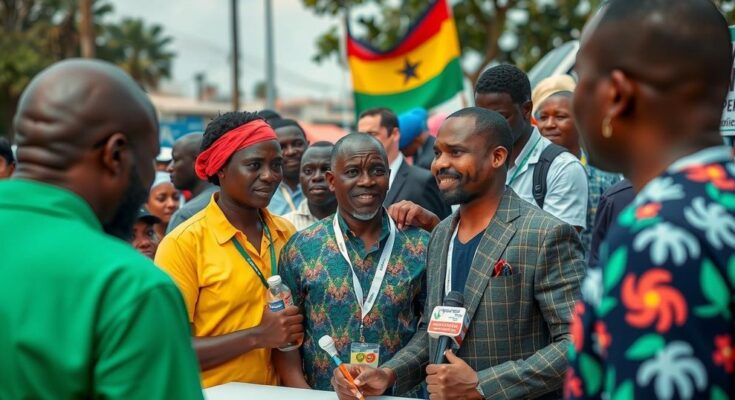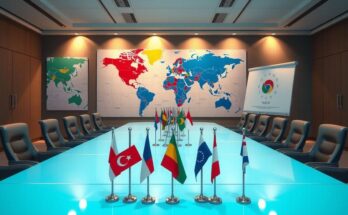Ghana’s December 7 elections feature a tight race between former President John Mahama and current Vice President Mahamudu Bawumia amidst economic challenges, including a major debt default and inflation. Voters express a desire for change, even as new candidates capture interest, indicating a potentially competitive political landscape in a historically two-party dominated system.
Ghana is poised for highly competitive national elections on December 7, with former President John Mahama challenging the ruling party’s candidate, Mahamudu Bawumia. Mahama promises to create a 24-hour business environment to enhance job creation and revive the nation’s economy, which has been recovering from a $30 billion external debt default in 2022. In response, Bawumia, the incumbent Vice President, also emphasizes his commitment to strengthening the economy amidst recent struggles related to the post-COVID pandemic.
Since 1992, Ghana has been predominantly governed by either the National Democratic Congress (NDC) or the New Patriotic Party (NPP), a trend that is expected to continue according to University of Ghana’s Kwame Asah Asante. He noted that minor parties have historically garnered less than 5% of the votes, yet any significant support for them could potentially lead to a second round of voting.
In Accra, excitement is palpable among voters, who have expressed their desire for change. Angela Ofori, an undecided voter, remarked, “Since 1992 to this year, we haven’t changed parties … we want [to] change to [a] different party so that we would see more improvements.”
Among the notable candidates is Nana Kwame Bediako, also known as Cheddar, who runs as an independent and aims to appeal to the youth with promises of eco-friendly policies alongside economic reforms. However, political analysts, including John Taden, doubt that Bediako will significantly impact the election outcomes this time around.
The economic climate is a central issue, particularly as Ghana navigates its way out of recent financial difficulties, worsened by the COVID-19 pandemic’s lingering effects and the global grain supply disruptions caused by the war in Ukraine. Critical issues such as infrastructure development, health, education, and corruption are also at the forefront of voters’ concerns. Asante emphasized that, “The economy will play an important role because it’s a bread-and-butter issue.”
Economic frustrations are evident among voters like Wisdom Gavor and Janet Bawah, who are leaning toward Mahama due to his proposed overhaul of the economic model. Conversely, supporters of Bawumia highlight his success in implementing digitalization initiatives, which have positively transformed various state operations. According to Taden, Bawumia’s reputation as “Mr. Digital” stems from his efforts to digitize the economy, leading to increased efficiency in government processes.
Despite the intense competition, Ghana remains a stable democracy in a region rife with political turmoil. Polls suggest the election results could be close, underlining the significance of strategic voter decisions in shaping the nation’s immediate future.
Ghana has shown a consistent pattern in its political landscape since the early 1990s, primarily oscillating between the two dominant parties, the NDC and NPP. This historical context is pivotal for understanding the current election dynamics. Voter fatigue over the status quo has emerged as a significant theme, particularly as the nation grapples with the aftermath of a massive debt default and extensive inflationary pressures that have spurred public unrest. The competing parties are also responding to emerging new candidates that appeal mostly to younger voters, indicating a potential shift in traditional voting patterns.
In conclusion, Ghana’s upcoming elections on December 7 are set against a backdrop of economic challenges and a desire for political change. While Mahama and Bawumia represent the established political framework, the emergence of independent candidates like Bediako signifies a growing demand among the youth for alternative solutions. Voter priorities strongly emphasize economic resurgence, underlying the pivotal nature of this election within the broader context of Ghana’s democratic stability.
Original Source: www.voanews.com




